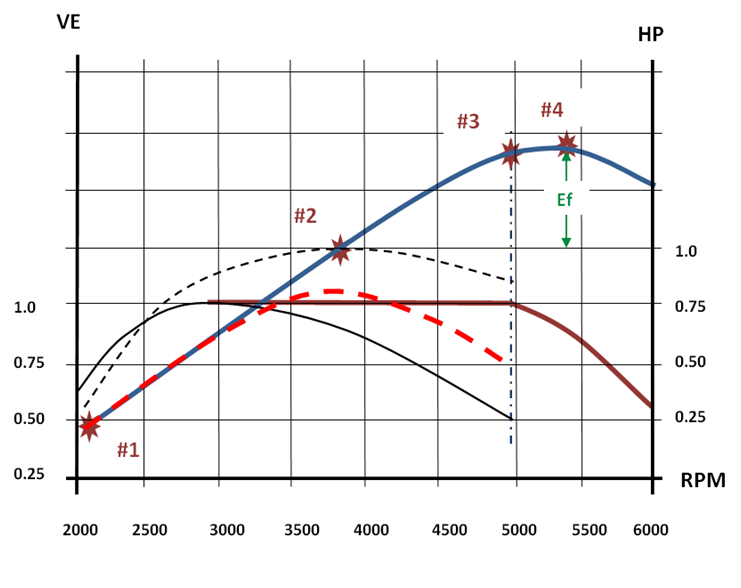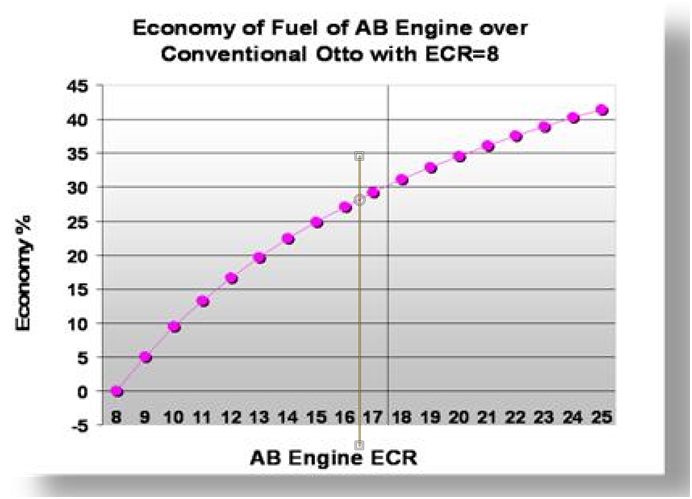  
Frequently Asked
Questions
|
Question 1. Recently we celebrated 100 years of the
Otto Internal Combustion Engine Patent. Dozens of huge companies
have put enormous funds into what seems like all possible aspects of
engine theory, design and practice. What did they miss? What was so
hidden from them that made our engine so superior to today’s
conventional solutions?
Question 2.It looks like the AB Engine,
compared to a conventional engine with the same engine volume burns
less fuel for each working cycle. Does this make the AB Engine have
a smaller power output? (It was a question from a traditional engine
design specialist).
Question 3.What is the actual fuel efficiency of your
engine? How much are the fuel savings?
-
Answer. Independent
of the kind of vehicle that the AB Engine will be installed on,
including Hybrids, the engine itself will be more efficient with
converting burnt fuel to mechanical (or electrical) energy by
25-45%. See a detailed explanation on AB Engine efficiency in
comparison to conventional engines.. click here (PDF
document)
Question 4.Can your technology be applied for
Diesel engines and also benefit their fuel efficiency?
-
Answer. Yes
it will definitely benefit diesel engines. In case of using
diesel engines, they will be designed with increased
compression/expansion ratios, compared to traditional Diesel
engines, and also the AB Engine intake valve with the
controller. This will limit the amount of gas so the actual
compression of gas will be lowered enough to the point where
diesel fuel will be self ignited. For example: if a conventional
engine has compression ratio of 16-20 then the AB Engine for
diesel fuel with be designed with one of 25-30; this will give
increased expansion ratio though fuel efficiency while keeping the
diesel burning condition the same as in a conventional diesel engine. The benefits of using the AB Engine technology with
diesel fuel are beyond that of just of increased fuel efficiency.
Increased design compression ratio will allow (for both gasoline
and diesel fuel) simplified piston compression coils and allowed
and controlled leaks that will lead to less energy loss on coil
friction, this allows for Higher RPM engines with overall
increased power output.
Question 5.There are many alternative fuel
developments. How is your technology benefiting there? Is your
technology necessary in this case?
|
|
-
Question 6.Are there any advantages in your engine
design except fuel efficiency?
-
Question 7. Is
this a completely new engine design? Is it possible to modify an
existing conventional engine to meet your technology
requirements? What about all the engine inventions that are
related to improvement of conventional engines such as Fuel Port
e.t.? Are they still useful in design with your technology?
-
Answer. AB
Engine is based 100% on basic Otto gasoline and Diesel engine
designs. Because of this, the majority of modern improvements
can be used in an AB Engine design as well. It is not a rewired,
impractical and complicated engine design; it is just the next
level of significant improvements to gasoline and diesel
engines. Manufacturers and vehicles developers will have no
major problem in adapting AB Engine technology.
-
Question 8.Are there any disadvantages in using AB
Engine technology?
-
Answer. The
AB Engine team could not find any except that we are adding
additional engine elements such as the AB Engine Intake valve
with controller. Majority of modern vehicles already utilize
computers to control many engine aspects. We expect that AB
Engine technology will have impact on engine design and market
penetration similar to the invention of the Fuel Port, but with
lots more possible improving solutions as in engines as in
vehicles designs
-
Question 9.What are the practical applications to
the AB Engine? Is it applicable for Electric Generators?
-
Answer. Majority
of internal combustion engines customers will benefit from using
AB Engines such as Electro Generators, boats, cars, trucks,
ships and motorcycles and so on.
-
Question 10. How
does your engine contribute (or compare) to the most efficient
automobile design on today’s market – Hybrids?
-
Question 11. Sterling
engine developers and manufacturers claim that their engine
exclusively has the highest fuel efficiency theoretically possible. Since
AB Engine also makes this claim, can you explain this disagreement?
Can a Sterling
engine be competitive to an AB Engine.
-
Answer. Not
in practice. The Sterling
engine design is not pragmatic as a power source in cars, boats
or any other widely used vehicles. They are slow to start,
difficult to build with higher power output and expensive.
Sterling engine promoters tried to put this engine on the car
many times and unsuccessfully. Please read FAQs about all
aspects of Sterling
engine at --> Here
On the contrary, AB Engine can be
implemented immediately in almost all devices and equipment,
especially where the power of Otto or Diesel Internal combustion
engines is now in use. Even if an AB Engine is designed with a
compression/expansion ratio of 20, this will make it the same
efficiency as a Sterling
engine. See link --->Here
AB Engine can also be designed
with compression/expansion ratios even higher than 20 (30-35),
this will allow the use of high octane ratio gasoline fuels or
diesel fuels with a thermo-efficiency as high as 0.6-0.7, far
exceeding the 0.5 that the Sterling engine can achieve (as per
the Sterling engine FAQs).
Please note that
even engines with 0.5 thermo-efficiency are very good engines
that are not in any practical vehicles now.
December 27 2011 company was
granted by US. Patent
#8,086,386 Download PDF file of patent here.
|

.png)


.png)
